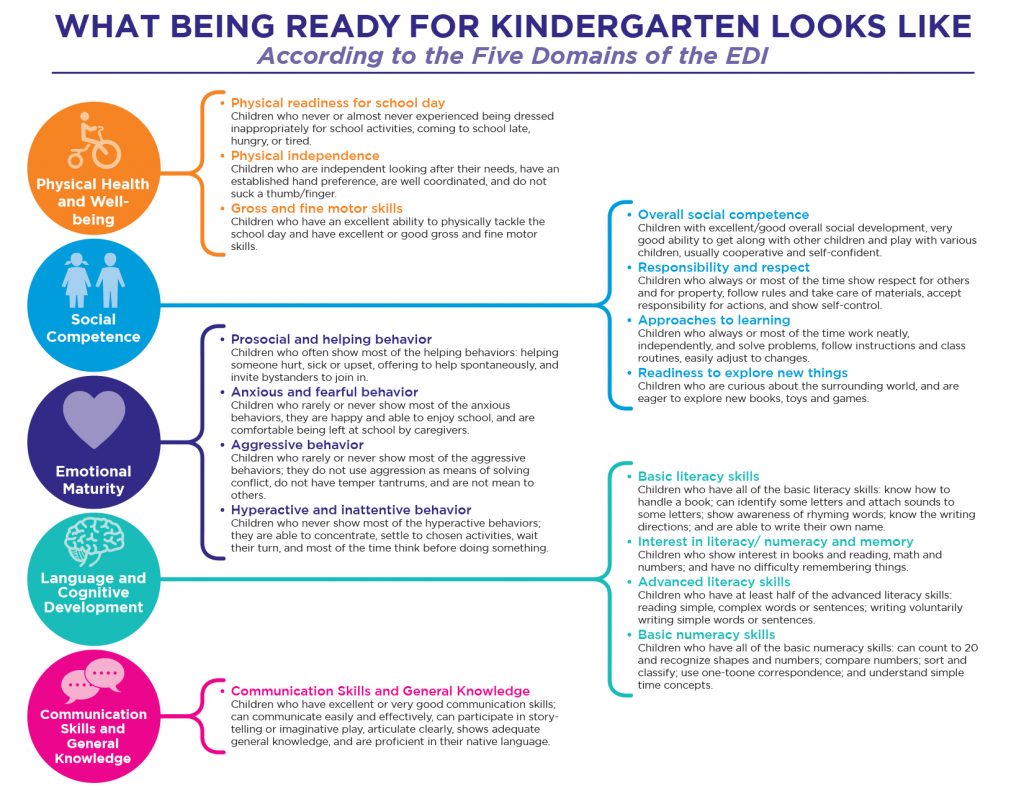For tens of thousands of parents of preschoolers throughout Los Angeles County, the beginning of the school year means you can finally get your mind off preparing your child for the classroom, after buying them new shoes and cartoon-themed backpacks filled with their favorite snacks.
But success in school for early learners is more than just having the right juice box. It can depend upon language and cognitive skills, emotional maturity, social competence, physical health and well-being, communication skills and general knowledge.
These five measurement domains, known collectively as the Early Developmental Instrument (EDI), are helpful not only in describing how children are developing, but also in predicting health, education and social outcomes. When a child participates in high-quality early care and education, for example, they are more likely to have stronger socio-emotional skills and be better prepared for academic achievement.
That’s why First 5 LA has launched the Kindergarten Readiness Assessment (KRA) Project, which partners with the UCLA Center for Healthier Children, Families and Communities to gather EDI data from nine participating school districts and communities representing more than 13,000 kindergarten students — or about 10 percent of L.A. County.
 Participating partners in the KRA include the City of Pasadena, Compton Unified School District, Connections for Children in Santa Monica, El Monte City School District, Los Angeles Unified School District, Mountain View School District, Pomona Unified School District, Rosemead School District and Lowell Joint School District.
Participating partners in the KRA include the City of Pasadena, Compton Unified School District, Connections for Children in Santa Monica, El Monte City School District, Los Angeles Unified School District, Mountain View School District, Pomona Unified School District, Rosemead School District and Lowell Joint School District.
Administered to incoming kindergartners by teachers once every three years, the EDI is a holistic measure that provides a community snapshot of children’s development and informs place-based planning. This data can be used to drive early care and education policy as well as fiscal and systems change to provide the best outcomes for L.A. County children.
“The EDI as used in the KRA provides a snapshot of how children are doing in a community. That data is important because it can inform community change,” said Becca Patton, First 5 LA director of early care & education. “It helps us, parents, local leaders, school districts and policymakers know how to best advocate for and invest in communities for resources that young children and their families need to succeed in school.”
To illustrate this impact, First 5 LA and First 5 Orange County joined forces to host the Learners Today, Leaders Tomorrow 2019 Summit in Long Beach, which focused on the use and implementation of EDI data to make strategic, local decisions about allocating and prioritizing resources and services for young children. Read about the event here.
The latest KRA snapshot from participating school districts and communities in L.A. County reveals:
- 48.2 percent of the 13,245 children with EDI records in L.A. County sites are considered ready for kindergarten (on track in all domains).
- Children are most vulnerable in language and cognitive development (only 69 percent of kids are on track).
- 42 percent of children are ready in communication skills and general knowledge.
- 41 percent of children are ready in prosocial and helping behavior.
- Children are most prepared in their physical readiness for the school day.
As a practical tool, the EDI also helps parents — who are their child’s first teacher — to understand what the different domains of development are and informs them about how to support their children in a developmental way, Patton said.
So what can parents do to help their preschooler get ready for kindergarten?
We’ve prepared the graphic below for parents, caregivers, child advocates and educators to better understand what “ready for school” looks like in the five EDI measurement domains: 1) physical health and well-being; 2) social competence; 3) emotional maturity; 4) language and cognitive development; and 5) communication skills and general knowledge. Each of these measurement domains has a sub-area further explaining the skills required.










